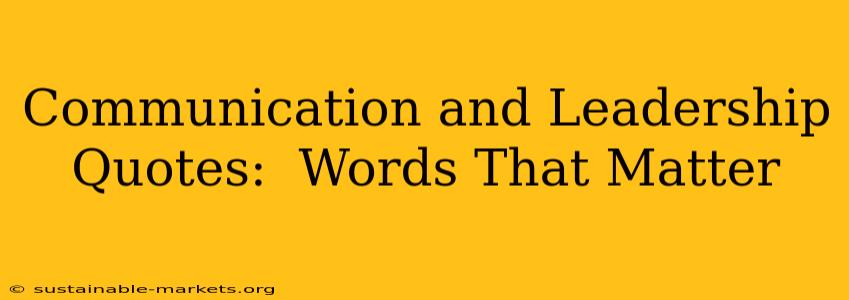Effective communication and strong leadership are intertwined, forming the backbone of successful organizations and individual achievements. The right words, at the right time, can inspire, motivate, and guide—leading to positive change and lasting impact. This article explores powerful quotes on communication and leadership, delving into their meaning and relevance in today's world. We'll also examine some frequently asked questions surrounding these critical topics.
What Makes a Good Leader?
Leadership isn't about holding a title; it's about influencing and inspiring others. Good leaders foster collaboration, trust, and a shared vision. They listen actively, communicate clearly, and empower their teams. A quote that perfectly encapsulates this is: "The key is not to prioritize what's on your schedule, but to schedule your priorities." – Stephen Covey. This highlights the importance of intentional leadership – focusing on what truly matters and allocating time accordingly, rather than simply reacting to immediate demands.
The Importance of Effective Communication in Leadership
Effective communication is the lifeblood of leadership. Without it, even the best intentions can fall flat. Clear, concise, and empathetic communication builds bridges, fosters understanding, and promotes collaboration. Consider this quote: "The single biggest problem in communication is the illusion that it has taken place." – George Bernard Shaw. This emphasizes the crucial need for verification and feedback to ensure messages are understood as intended. Misunderstandings can quickly derail projects and damage relationships.
How Can I Improve My Communication Skills?
Improving communication skills is a journey, not a destination. It involves continuous learning and self-reflection. Here are some key steps:
- Active listening: Truly hearing and understanding what others are saying, without interrupting or formulating your response prematurely.
- Empathy: Putting yourself in others' shoes to understand their perspectives and feelings.
- Clarity: Expressing your thoughts and ideas concisely and directly.
- Nonverbal communication: Paying attention to your body language, tone of voice, and facial expressions.
- Seeking feedback: Regularly asking for constructive criticism to identify areas for improvement.
What are the biggest communication barriers in leadership?
Several factors can hinder effective communication in leadership roles:
- Lack of trust: If team members don't trust their leader, they're less likely to be receptive to their messages.
- Poor listening skills: Failure to actively listen can lead to misunderstandings and resentment.
- Information overload: Too much information can be overwhelming and difficult to process.
- Cultural differences: Differences in communication styles can create barriers to understanding.
- Fear of conflict: Avoiding difficult conversations can prevent the resolution of important issues.
How does communication style affect leadership?
Different communication styles can have a significant impact on leadership effectiveness. Some leaders prefer a direct and assertive approach, while others favor a more collaborative and supportive style. The most effective leaders are often adaptable, adjusting their communication style to suit the situation and the audience. For example, a leader might use a more formal and structured communication style when addressing a large group, but a more informal and personal style when communicating with individual team members.
Can you give examples of inspirational leadership quotes?
Numerous quotes highlight the inspirational qualities of great leaders:
- "Leadership is the art of getting someone else to do something you want done because he wants to do it." – Dwight D. Eisenhower. This emphasizes motivation and influence over coercion.
- "The greatest leader is not necessarily the one who does the greatest things. He is the one that gets the people to do the greatest things." – Ronald Reagan. This underscores the importance of empowering others.
Conclusion: The Power of Words
In conclusion, effective communication and strong leadership are intrinsically linked. The quotes explored in this article offer valuable insights into the importance of clear communication, active listening, and empathetic understanding. By mastering these skills, leaders can inspire, motivate, and guide their teams to achieve extraordinary results. The power of words, wielded effectively, can shape not only organizations but also the world around us.

